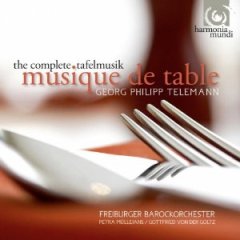Georg Philipp Telemann – Tafelmusik (Freiburger Barockorchester)
Georg Philipp Telemann – Tafelmusik (Freiburger Barockorchester)

CD 1: Part I Overture in E minor Quartet in G major Concerto for flute violin & cello in A major CD 2: Part I Trio in E flat major Flute Sonata in B minor Sinfonia in E minor 'Conclusion' Part II Overture in D major Quartet in D minor CD 3: Part II Concerto for 3 violins in F major Trio in E minor Violin Sonata in A major Conclusion in D major CD 4: Part III Overture in B flat major Quartet in E minor Concerto for two horns & strings in E flat major Trio in D major Oboe Sonata in G minor Conclusion in B flat major Freiburger Barockorchester Petra Müllejans - conductor Gottfried von der Goltz – conductor
In his Musique de Table, through skilful organisation, breadth of imagination and sheer masterful inspiration, Telemann concentrates the entire range of European musical styles. This bravura display brings together 'what stern custom had divided'. Here is the ultimate glittering banquet of late Baroque gout in all its rich diversity.
The Freiburger Barockorchester can look back on a success story lasting over 20 years and is a popular guest at the foremost concert halls and opera houses. The Freiburgers' artistic credo, however, remains unchanged: the creative curiosity of each individual member, with the aim of playing a composition in as lively and expressive a manner as possible. This also involves assigning demanding solo concertos to players from the orchestra's own ranks. Cultivated, yet at the same time exciting, ensemble playing has thus become the orchestra's international trademark.
The FBO collaborates with leading artists such as René Jacobs, Andreas Staier and Thomas Quasthoff, and enjoys a close cooperation with harmonia mundi France. Under the artistic directorship of its two Konzertmeisters Gottfried von der Goltz and Petra Müllejans, and under the baton of selected conductors, the FBO presents around 100 performances per year in a variety of formations from chamber to opera orchestra: a self-governing ensemble with its own subscription concerts at the Konzerthaus in Freiburg, the Liederhalle in Stuttgart and the Berlin Philharmonie in addition to a worldwide touring programme. ---Editorial Reviews
Georg Philipp Telemann's Tafelmusik is a collection of orchestral and chamber music in three large parts, each consisting of half a dozen works. It contains plenty of colorful music that's often heard by the piece, and the entire set, covering four CDs, represents a serious investment of time and money, even at the discounted price of this Harmonia Mundi release. Yet there's a strong case that a good Baroque music collection and certainly a library should contain a copy of the whole set, as indeed many collections did in the middle of the 18th century. The work's title and concept are modest: Tafelmusik means "table music," and each work in the individual sets is meant to correspond with a course of a meal. But the utilitarian veneer conceals an ambitious and synoptic work. The booklet notes (in French, English, and German) goes into quite a bit of detail: not only did Telemann participate in the ongoing effort to reconcile and combine the French and Italian styles, he also deepened his stylistic survey in several other ways. Most strikingly, he wrote French works with Italian elements, and vice versa. The Overture in D major that opens Part II (CD 2, tracks 10-14) is ostensibly a French form, but its individual movements avoid dance movements and instead exploit the group contrasts of Italian music. Further, the combination of orchestral and chamber music, which Telemann explicitly specified (and which ought to give pause to groups that automatically assume small ensembles are best), is unusual in itself. On top of all this, the occasional dashes of Polish folk rhythms (try the finale of the Quartet in D minor, CD 2, track 18) and the appearance of the new genres of sinfonia and quartet all combine to give the collection, taken as a whole, a brilliantly kaleidoscopic quality. The Freiburg Baroque Orchestra simply does not have a weak point in addressing the set's many demands. Vivacious soloists, crisp orchestral ensemble work, a certain feel for Telemann's pure flair: it's all here, and with absolutely top-notch sound, it adds up to a must-have for serious Baroque enthusiasts. ---James Manheim, allmusic.com








